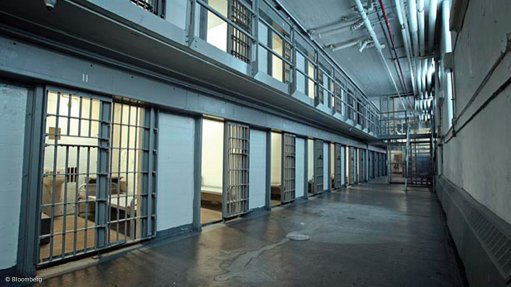
Photo by: Bloomberg
A group of inmates sued the Minister of Justice and Correctional Services in 2015, after allegedly being assaulted and tortured by prison officials at Leeuwkop Maximum Correctional Centre in Gauteng.
The inmates claimed they were beaten with batons, punched, slapped, and electrocuted.
They claimed prison officials also unleashed dogs on them. Apparently, some inmates were stacked on top of each other in a pile against a wall.
They now seek damages for pain, suffering and emotional trauma caused by the assault, torture and loss of amenities.
The assault and torture allegedly occurred on 10 August 2014, after cell B1's door was jammed, preventing prison officials from going in.
The prisoners' trial kicked off in the Gauteng High Court in 2019, but was delayed due to the Covid-19 pandemic.
The men, Xolani Zulu, Llewellyn Smith, Benson Qibi, Abel Phasha and Mthokozisi Sithole, are being represented by Lawyers for Human Rights and Webber Wentzel.
They argued they were "subjected to torture or other cruel, inhuman, or degrading treatment, which is prohibited under the Prevention of Torture Act and Section 12(1) of the Constitution".
Lawyers for the inmates said:
This is a case in which officials of the state not only failed in their duty to see to the physical welfare of prison inmates, but subjected those inmates to assault so egregious that it rose to the level of torture.
The men brought two claims against the minister on the basis of "vicarious liability, for the wrongful and unlawful acts of employees of the Department of Correctional Services [DCS]".
"Claim B arises from the unlawful and wrongful detention of the second to fifth plaintiffs in isolated segregation at Leeuwkop, also amounting to torture, over the period 10 to 26 August 2014."
This is how much the men are claiming for damages in claim A:
- Llewellyn Smith: R1 828 000.
- Xolani Zulu: R1 678 000.
- Benson Qibi: R1 828 000.
- Abel Phasha: R1 728 000.
- Mthokozisi Sithole: R1 728 000.
- Meanwhile, for claim B, Zulu, Qibi, Phasha and Sithole want R200 000 each.
According to court papers, the department admitted the prison officials used force against the inmates, but denied force was used in the manner alleged by the inmates.
It also admitted the inmates sustained injuries, but disputed the nature and extent of the injuries.
The department said the use of force was justified as "precautionary measures" taken in self-defence.
In respect of the second claim, it admitted four of the inmates were placed in segregation, but contended such segregation was authorised and lawful.
However, according to the court papers, the department denied the inmates had been segregated, saying they were only separated.
The inmates' lawyers said, "The plaintiffs claim compensation for non-patrimonial harm, being the impairment and infringement of their right to freedom and security of the person, including the right to bodily and psychological integrity, their right to dignity and their right to privacy. These rights are protected as personality rights under the common law and under sections 10, 12 and 14 of the Constitution.
"We submit that it emerges clearly from the plaintiffs' various accounts of their assaults that DCS officials assaulted the plaintiffs in order to solicit information as to who was hiding or in possession of illicit cellphones [and] … who had blocked the door of cell B1.
"What also emerges clearly from the plaintiffs' accounts of the events is that none of the plaintiffs or fellow inmates were the aggressors on 10 August 2014. At all times, the plaintiffs were victims of an egregious and protracted series of assaults at the hands of multiple DCS officials.
"The injuries as reported by both the DCS and independent doctors are physical traumatic injuries generally of a severe nature for all plaintiffs," said the lawyers.